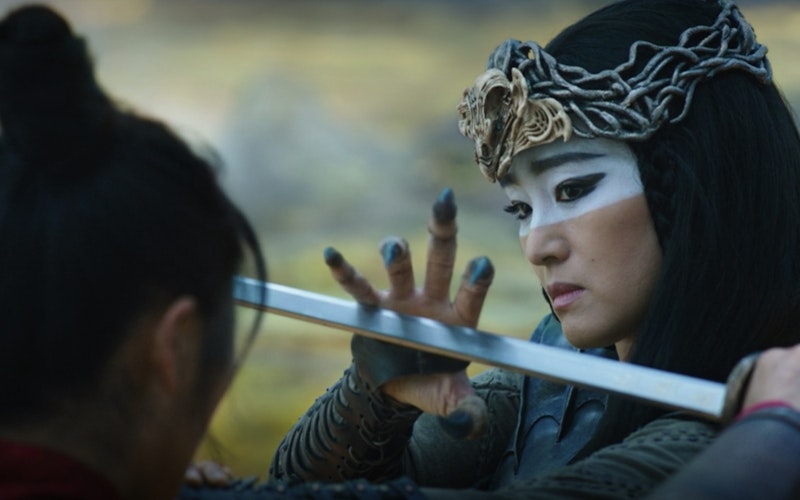
Movies
Mulan’s Mesmerizing Witch
Disney’s live-action Mulan offers a fresh retelling of the Chinese legend about the female warrior. There are new narrative twists and one particularly original addition: the witch, Xianniang. From the moment Xianniang (played by the incredible Gong Li) appears on screen, it’s hard to not want to see more of her talons and shape-shifting, dazzling hauteur, which offers a mysterious and complex vision of womanhood and power.
Though Xianniang has chosen to join forces with the film’s villain, Böri Khan (Jason Scott Lee), she’s undoubtedly a tragic heroine, much like Angelina Jolie’s Maleficent, who is forced into villainy against her will because she can’t find a place in society as her true self.
In traditional Chinese folklore, Mulan and Xianniang are portrayed as blood sisters. In this remake of Disney’s 1998 animated feature, Xianniang is a witch and semi-antagonist to Mulan (Yifei Liu), the young woman who disguises herself as a male warrior in order to take her ailing father’s place in defending the kingdom against Böri Khan. However, their sisterhood remains. Xianniang continually reminds Mulan that they are the same. They have similar gifts and an ability to harness qi (aka “chi,” the natural energy of the world), which builds a bond between them.
This bond is symbolically depicted in the film through the use of birds. Xianniang is a shape-shifting falcon (a nod to Hayabusa, the falcon who serves Shan Yu in the 1998 film). She also has the ability to transform into a thousand birds. Mulan, meanwhile, is protected by the phoenix, the bird of her ancestors, which guides her on her path to becoming a warrior. Birds have always been part of the folkloric imagination. They follow heroes on quests, uncover secrets, give warning and shrewd council. In this case, Xianniang as falcon becomes Mulan’s mentor and protector. She knows Mulan better than herself and pushes her to self-discovery, even laying down her life for Mulan in the end. It’s a complex relationship that runs deep and even reflects biblical notions of sisterhood.
In Scripture, we find a robust picture of sisterhood, in which women serve one another and the world by encouraging one another to love and good works. Think of Ruth and Naomi, Mary and Elizabeth, even Mary and Martha. These are women who have each other’s backs, who watch out for each other, and enable each other to do hard and good things. In her book, Closer Than a Sister, Christina Fox writes that biblical sisterhood is defined as women “sharing life together. Spiritual life. It is about working together to bring about God's Kingdom purposes. It is about serving together, helping each other through trials, lifting each other up when we fall, praying for one another, urging one another on in the faith. And ultimately, it is reflecting Christ in our love for one another, imaging him to the fallen world around us.” Biblical sisterhood is mapped out in women sharing each other’s burdens, sharpening each other emotionally, spiritually, and intellectually, and even choosing to lay down their lives for one another.
In Scripture, we find a robust picture of sisterhood.
Xianniang is the sister Mulan needs in order to be her true self and cultivate her unique gifts as a female warrior. This is made most evident in their direct confrontation halfway through the film. They meet alone in a sulfur pass within a mountainside; the gorgeous landscape is matched by an equally elegant action sequence, as Xianniang repeatedly asks Mulan, “Who are you?” Mulan’s trained response—“Hua Jun, a soldier in the imperial army”—is the lie that the witch seeks to dismantle. “Deceit weakens your qi,” she tells Mulan, a truth she lays bare while putting her own prowess and skills on display. The three main virtues that Mulan wants to embody—the three virtues written on her own sword—are “loyal,” “brave,” and “true.” Here we see Xianning pushing Mulan to live in to the latter by tossing aside the ruse of disguising herself as a man and fully embracing her womanhood.
In the same way that Elizabeth is built up and inspired by Mary in Luke 1, Xianniang seeks to inspire Mulan to greater purpose. Her call for Mulan to be true is strangely similar to the biblical language of exhortation to turn from sin. It’s a moment of putting the encouragement of Hebrews 10 into motion, as Xianniang seeks to embolden Mulan and stir her to good works. She even pierces the young girl in the chest with a blade that catalyzes her transformation (dare I even say conversion). As Mulan lies lifeless, face down on the sulfur, the narrator says, “Hua Jun did die. For a lie can only live so long. But Mulan, Mulan lived.” Mulan then stands up, pulls down her hair, and goes out to fight Böri Khan’s invading army as a fully feminine soldier. We understand that she was only capable of this feat by her sister’s prompting.
Interestingly, Xianniang does not see Mulan as competition. In so many Disney tales we see two women caught in the lie that only one of them can exist within society (think Snow White). Xianniang, on the other hand, lives into the truth of Ecclesiastes 4 that “two are better than one.” She actively builds a world in which she and Mulan can take their place together and, in doing so, reflects a desire for a sister relationship based on holy love, as God intended. In perhaps its greatest departure from the 1998 animated film, the live-action Mulan doesn’t seek to overthrow patriarchy or unfair gender stereotypes. Rather, it creates a tale about women finding the freedom to be their true selves. And an intimate sisterhood that cares for each other’s flourishing is the key to this discovery.
Topics: Movies